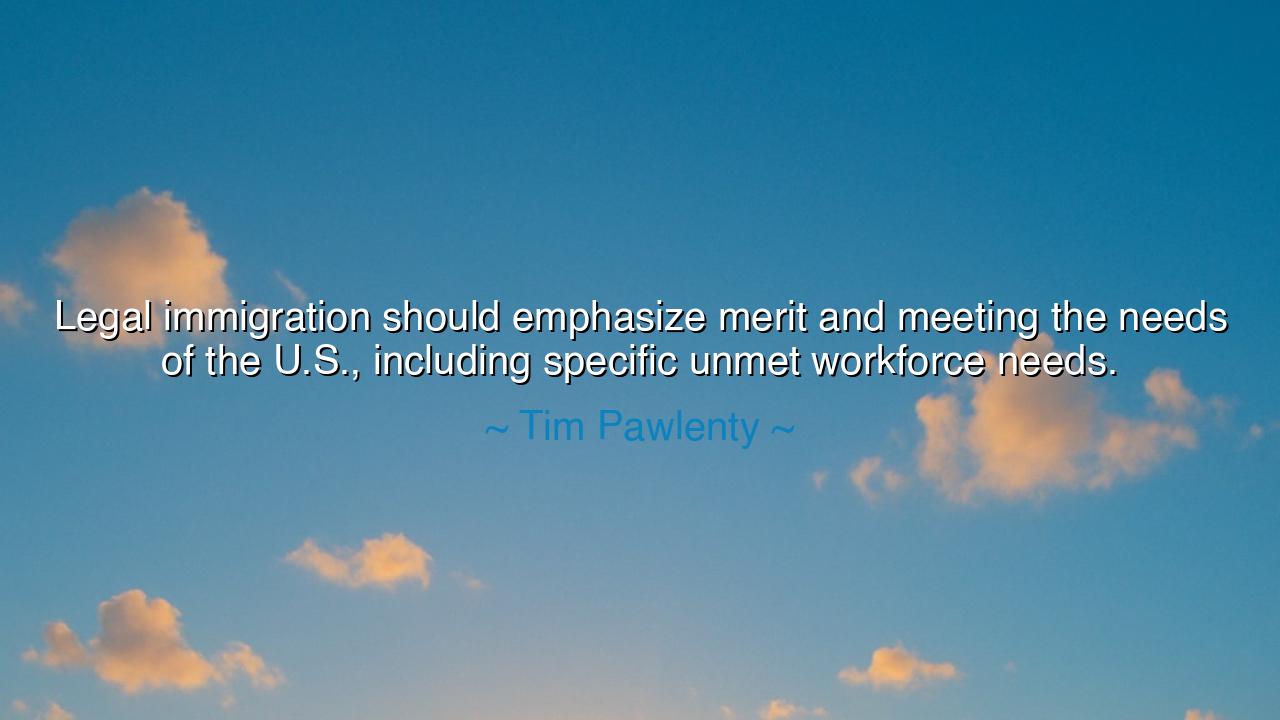
Legal immigration should emphasize merit and meeting the needs of
Legal immigration should emphasize merit and meeting the needs of the U.S., including specific unmet workforce needs.






"Legal immigration should emphasize merit and meeting the needs of the U.S., including specific unmet workforce needs." Thus spoke Tim Pawlenty, giving voice to a principle both practical and deeply rooted in the history of nations. His words reveal the tension between compassion and pragmatism, between the open door of welcome and the careful shaping of a society’s destiny. For immigration has ever been a fire that forges nations—yet it must be tempered, lest the fire consume rather than build. In his vision, merit and the meeting of needs form the measure by which new citizens may join the great republic.
The origin of this wisdom lies in the long tradition of peoples who shaped their borders not only by geography, but by the skills and strength of those they admitted. The United States itself was built by waves of immigrants—farmers, builders, inventors, thinkers—who brought with them the talents needed to cultivate a young and growing nation. From the railroads laid by Chinese laborers to the steel forged by European hands, from the inventions of immigrant scientists to the artistry of foreign-born creators, America’s story is written in the sweat and genius of newcomers. Pawlenty’s words draw upon this heritage, declaring that the gate of legal immigration must remain open, but guided by wisdom: who enters must be those who strengthen, not weaken, the house.
History provides a striking example in the Homestead Act of 1862, when the United States offered land to settlers willing to work and cultivate it. Millions, including many immigrants, took this opportunity, transforming empty plains into thriving farms. The Act was not merely generosity; it was policy crafted to meet the pressing workforce needs of the time—settling the frontier, feeding the nation, and building communities. In this way, America grew strong not by accident, but by aligning immigration with national necessity. Pawlenty’s creed continues this logic: immigration as a tool not only of compassion but of construction, fitted to the needs of the age.
Yet, his words are also a call for balance. To emphasize merit does not mean to strip away humanity, nor to deny refuge to the oppressed. Rather, it is to remember that a nation, like a household, must remain stable to be generous. A house that falls into disrepair cannot shelter even its own. Thus, by aligning immigration with the needs of the workforce, by welcoming those who bring skills, knowledge, and industry, the republic ensures that it may continue to thrive, and thereby remain strong enough to aid others. It is a vision not of closed doors, but of purposeful stewardship.
This teaching is both practical and heroic. It calls leaders to think not only of the moment, but of generations. It asks: what do we lack, and who may help us build it? Where are the hands to till the soil, the minds to craft innovation, the healers to tend the sick, the builders to raise the cities? To shape immigration in this way is to honor both the dignity of the immigrant and the destiny of the nation, joining them together in mutual need and shared opportunity.
The lesson for us is clear: a nation must welcome, but it must also discern. To admit without measure may sow discord and strain; to close the gates entirely may starve growth and wither progress. True wisdom lies in opening the door to those whose merit answers the needs of the people, and whose dreams align with the promise of the land they enter. In this, both immigrant and nation find fulfillment.
What practical steps must we take? Shape immigration policies that match the changing needs of the age: when fields are empty, admit laborers; when hospitals cry out, admit healers; when technology advances, admit innovators. Provide clear pathways for those of skill and character, and strengthen systems that ensure fairness, transparency, and opportunity. And above all, remember the humanity of those who seek entry—not merely as workers, but as future citizens, builders of families, communities, and legacies.
So let Pawlenty’s words be remembered: legal immigration must be guided by merit and by need, for in such balance lies the strength of nations. A republic grows mighty when it welcomes wisely, when it marries its own destiny to the gifts of those who arrive at its shores. In this union of need and merit, the land is renewed, the people are strengthened, and the dream of liberty is passed on to future generations.






AAdministratorAdministrator
Welcome, honored guests. Please leave a comment, we will respond soon